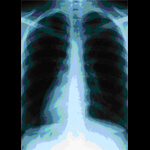
Fever, aches and pains, dry cough and sore throat – some might think these are the worst consequences of the flu. On the contrary, people should be aware that pneumonia, a serious infection of the lungs, can result from complications of the flu or other upper-respiratory illnesses.
“Forty percent of people considered at high risk for the flu or pneumonia, and who should be getting the flu and pneumonia vaccines, do not receive them,” said Antonio Anzueto, M.D., professor of medicine in the division of pulmonary diseases and critical care medicine at the Health Science Center. “People 65 and older are among those considered at high risk for the flu and pneumonia. Nowadays, many retirees have taken on the role of after-school babysitters for their grandchildren. That could leave many elderly vulnerable to acquiring the bacteria that causes pneumonia,” he said.
According to the American Lung Association, pneumonia and influenza together rank as the seventh leading cause of death in the United States. Pneumonia consistently accounts for the majority of deaths.
But there’s hope for those who are hospitalized. Eric Mortensen, M.D., assistant professor of medicine, and Marcos Restrepo, M.D., assistant professor in the division of pulmonary and critical care medicine and the division of infectious diseases, are the authors of a pneumonia study published in The American Journal of Medicine. The team of researchers demonstrated that guidelines for the treatment of patients with community-acquired pneumonia, set by the Infectious Diseases Society of America (IDSA) and the American Thoracic Society (ATS), are the most effective in preventing death among patients hospitalized with this condition.
They were among the first in the nation to conduct a study that specifically looked at guideline-consistent therapy.
“There were many questions about whether or not these practice guidelines would be effective, and limited evidence supported the IDSA and ATS recommendations,” Dr. Mortensen said. “Our study, however, helped prove that they were indeed effective.”
An important first step in effective IDSA and ATS treatment is that the patient receives at least one dose of antibiotics tailored to that patient’s needs within the first four to eight hours after the patient is admitted to the hospital. The study showed that the death rate among patients who received this particular therapy was 6.2 percent compared to 21.7 percent in those who did not receive it.
Dr. Anzueto is taking the investigation to the next level. He is leading a study that focuses on the treatment of patients with severe lung disease that can occur as a complication of pneumonia. The study is funded by a $500,000 six-year National Heart, Lung, and Blood Institute (NHLBI) grant.
“The information we gather from this study will allow us to further identify factors that will result in better treatment for pneumonia patients,” he said. Dr. Anzueto serves on a joint IDSA and ATS panel of experts charged with establishing further guidelines for the management of patients with community-acquired pneumonia. These new guidelines will be released in 2006.
Who is most at risk for pneumonia?
Those most at risk for pneumonia are: the elderly; the very young; and those with underlying health problems such as chronic obstructive pulmonary disease (COPD), diabetes, congestive heart failure, sickle-cell anemia; or those with other immune-suppressing diseases such as AIDS. Patients undergoing cancer therapy or organ transplantation are also vulnerable.
How is pneumonia treated?
Viral pneumonia usually heals on its own. Treatment with antibiotics can cure bacterial pneumonia. A pneumococcal vaccine also is available and may protect against pneumonia caused by the pneumococcus bacterium.
Who should get vaccinated?
People ages 65 or older and those considered at high risk are advised to receive the pneumonia vaccine. The influenza vaccine is also recommended, as pneumonia can present itself as a complication of the flu.

